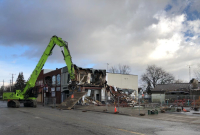Support strong Canadian climate journalism for 2025
WHEATLEY, Ont. — Almost two years after a gas explosion blew a hole in this Lake Erie village’s downtown, some residents still exiled from their homes feel they just aren’t getting the help they need to rebuild their lives.
The Wheatley explosion was caused by gas that seeped into an old water well and then collected in the basement of a building that blew up on Aug. 26, 2021, injuring 20. Although the origin of the gas has never been identified, multiple old wells were mapped in Wheatley and are widely believed to be the source. Three abandoned wells have been sealed and capped, and a section of the downtown is still fenced off. A small flare stack sits nearby in case it is needed to burn off the methane or highly toxic hydrogen sulphide if it builds up again.
Several other houses, businesses and apartment buildings were also damaged in the blast, some so badly, they had to be demolished. While the community hosted an influx of oil and gas workers trying to identify and cap the wells, many residents were forced out of their homes.
Some are still unable to return.
For evacuee Stephanie Charbonneau, Wednesday’s announcement was “absolutely meaningless.” Charbonneau, her husband and two daughters, aged 4 and 6, have lived in three different locations since the explosion and are still watching work proceed slowly on rebuilding their home.
“This was a meeting that should have been an email. It’s just one government paying another one,” she tells Canada’s National Observer about the news conference held at the Wheatley fire hall. “This brought up a lot of emotions and anxiety for me today.”
The funding includes $8 million to reimburse the municipality of Chatham-Kent for direct expenses to do with the explosion aftermath, $3 million more for future risk management and investigation at the site, and $225,000 to help Chatham-Kent fund a local committee working on community redevelopment.
Charbonneau says there’s no money there to help the evacuees with “the amount of time and money we had to spend in order to rebuild our life while still holding on to the life we were forced out of.”
“I’m glad the municipality is getting that money, but I am still spending an exorbitant amount of money to live a life that wasn’t the life I chose.”

While her insurance company has “dealt fairly” with them and they hope to move back by October, they still can’t get to most of their belongings, which are in storage. The family has only days left to settle an insurance claim for their possessions as time runs out on the two-year anniversary of the explosion. Charbonneau says it’s impossible to estimate the value of their possessions when they are in storage, but the insurer refused their request for an extension. “This may just be a loss we have to take,” she says with resignation.
Her family has also incurred extra expenses in gas mileage and such because they have not been able to find a place to live in Wheatley and are instead living in a rural area.
The funding announced Wednesday is in addition to $27 million already promised by the province for the local government’s expenses and for supports to businesses and homeowners in Wheatley, said Natural Resources and Forestry Minister Graydon Smith.
While Charbonneau was disappointed by the lack of direct financial aid, she says locals were also let down when no money was forthcoming to buy out owners of buildings that may have to be demolished.
Speaking at the announcement, Chatham-Kent’s chief administrative officer Michael Duben said appraisals are still being completed before discussions can take place on buyouts. Buying those properties and tearing them down will allow workers a better chance at finding the source of the gas and protect residents, Duben said.
The Wheatley explosion resulted from the third in a series of gas leaks detected in the community during the spring and summer of 2021. A $100-million class-action lawsuit has been launched against Chatham-Kent and a company hired by the municipality to help monitor the gas leaks prior to the explosion.






Comments
Oneo f the little know n or heeded dangers of the oil/gas industry and its intransigent refusal to rehabilitate abandoned wells. It isn't only Alberta which has this problem. Everywhere in Canada where wells have been drilled for oil/gas, this deadly risk continues to wreak havoc on individuals and communities; while the industry strolls away laughing all the way to the bank..